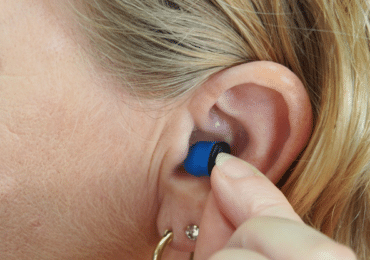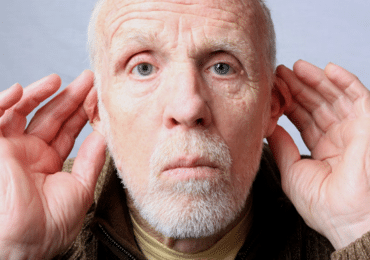Hearing enables us to engage in conversations, appreciate music, and stay alert to our surroundings. However, there are times when this vital sense becomes compromised, leaving us grappling with hearing problems that can impact our quality of life. Whether it’s a sudden loss of hearing or a gradual decline over time, addressing hearing issues promptly is crucial. From understanding the signs to seeking professional help, here are immediate steps you should take if you find yourself experiencing hearing problems.

Recognize the Signs
The first step in addressing any issue is recognizing that there is a problem. Hearing problems can manifest in various ways, including difficulty understanding conversations, needing to increase the volume on electronic devices, or feeling like others are mumbling. If you’re not sure, take a test to see where your hearing is at. You might also notice trouble hearing high-pitched sounds or distinguishing between different voices in a noisy environment. Tinnitus, a ringing or buzzing sensation in the ears, is another common indicator of hearing issues. Being aware of these signs can help you acknowledge the problem and take action sooner rather than later.
Avoid Delay
Procrastination is the enemy when it comes to hearing problems. Ignoring or delaying addressing these issues can lead to further complications. Hearing loss, if left untreated, can have a significant impact on your cognitive abilities, social interactions, and emotional well-being. The brain’s ability to process auditory information might decline over time, making it harder to adapt to hearing aids or other interventions. By taking immediate steps, you can potentially prevent the deterioration of your hearing and ensure a smoother path to recovery.
Seek Professional Help
Upon recognizing the signs and the importance of timely action, the next step is to consult a hearing healthcare professional. Audiologists are trained to assess the extent of your hearing loss, identify potential underlying causes, and recommend appropriate interventions. They can perform hearing tests, discuss your medical history, and provide expert guidance on the best course of action. Whether your hearing loss is due to age, noise exposure, or other factors, seeking professional help is an essential part of your journey toward better hearing.
Explore Treatment Options
Modern advancements in audiology offer a range of treatment options catering to various types and degrees of hearing loss. Depending on your specific situation, your audiologist might recommend hearing aids, cochlear implants, assistive listening devices, or other solutions. Hearing aids, for example, come in diverse styles and technologies, including invisible-in-canal, behind-the-ear, and rechargeable options. Exploring these options with your healthcare provider ensures that you choose the solution that best suits your needs and lifestyle.
Embrace Lifestyle Changes
In addition to seeking professional help and exploring treatment options, making certain lifestyle changes can complement your efforts to address hearing problems. Protecting your ears from loud noises is essential to prevent further damage. Avoid prolonged exposure to loud environments and use ear protection, such as earplugs or earmuffs, when engaging in activities like attending concerts or using power tools. Furthermore, adopting a healthy lifestyle can contribute to better hearing health. Regular exercise, a balanced diet rich in nutrients, and managing chronic conditions like diabetes can positively impact your auditory system.
- Limit Noise Exposure: Loud noises can accelerate hearing loss. Be mindful of your surroundings, and when in noisy environments like concerts or construction sites, use ear protection such as earplugs or earmuffs. Minimize exposure to excessively loud sounds to prevent further damage.
- Incorporate Hearing-Friendly Activities: Engaging in activities that stimulate the auditory system can be beneficial. Listening to soothing music or engaging in conversations in quieter settings can help train your brain to process sound more effectively and maintain its responsiveness.
- Prioritize Cardiovascular Health: Good circulation is crucial for maintaining healthy hearing. Regular exercise improves blood flow to the ears and helps protect delicate auditory cells. Incorporate cardiovascular activities like walking, swimming, or cycling into your routine to support your hearing health.
- Manage Stress: Chronic stress has been linked to a range of health issues, including hearing problems. Practice relaxation techniques such as meditation, yoga, or deep breathing to reduce stress levels. By managing stress, you can potentially mitigate its negative impact on your auditory system.
Educate Yourself and Loved Ones
Knowledge is a powerful tool when it comes to managing hearing problems. Educate yourself about the causes of hearing loss, the importance of early intervention, and the available treatment options. This understanding will empower you to make informed decisions about your hearing health. Additionally, sharing this knowledge with your loved ones can foster a supportive environment. Family and friends can play a significant role in your journey by being patient, practicing effective communication strategies, and encouraging you to prioritize your hearing health.
Practice Communication Strategies
Experiencing hearing problems might lead to challenges in communication, both for you and those around you. Engage in open conversations with your family, friends, and colleagues about your hearing difficulties. Implement communication strategies such as facing the speaker, asking them to speak clearly and at a reasonable pace, and choosing quiet environments for discussions. Utilize visual cues and context to aid comprehension, and don’t hesitate to inform others about your preferred communication methods.
- Open Dialogue: Initiate open conversations with your loved ones about your hearing difficulties. Explain the challenges you face and how they can support you in effective communication.
- Clear Speech Request: Politely ask those you interact with to speak clearly and at a moderate pace. This can significantly improve your ability to understand and engage in conversations.
- Optimal Settings: Choose quieter environments for discussions whenever possible. Minimizing background noise can make it easier for you to focus on the speaker’s words.
- Visual Support: Utilize visual cues and context to enhance comprehension. Lip-reading and observing facial expressions and body language can provide valuable context to aid in understanding.

In the journey to address hearing problems, the importance of immediate action cannot be overstated. By recognizing the signs, seeking professional help, exploring treatment options, embracing lifestyle changes, educating yourself and others, and practicing effective communication strategies, you pave the way for improved hearing health and a better quality of life. Remember, addressing hearing issues involves a network of support, including healthcare professionals, loved ones, and your own commitment to proactive care.

